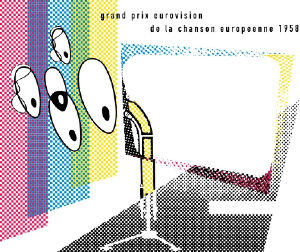Eurovision Song Contest 1958
| Eurovision Song Contest 1958 | |
|---|---|
 |
|
| Dates | |
| Final | 12 March 1958 |
| Host | |
| Venue |
AVRO Studios Hilversum, Netherlands |
| Presenter(s) | Hannie Lips |
| Conductor | Dolf van der Linden |
| Host broadcaster | Nederlandse Televisie Stichting (NTS) |
| Interval act | Metropole Orkest |
| Participants | |
| Number of entries | 10 |
| Debuting countries | |
| Returning countries | None |
| Withdrawing countries | |
| Vote | |
| Voting system | Each country had 10 jury members who each awarded 1 point to their favourite song |
| Nul points | None |
| Winning song |
"Dors, mon amour" |
The Eurovision Song Contest 1958 was the third Eurovision Song Contest. The contest took place in Hilversum, Netherlands, following the country's win at the 1957 Contest, forming the convention that the winning country of the previous Eurovision Song Contest hosts the following year's contest. The event was held on Wednesday 12 March 1958 at AVRO Studios. The winner was France with the song "Dors, mon amour", performed by André Claveau, written by Pierre Delanoë and composed by Hubert Giraud.
Ten countries participated. It was France's first win. Sweden made its debut while the United Kingdom was the first choice to stage the contest, however following a failure to get an agreement from various artistic unions, the BBC withdrew their bid in the summer of 1957 and the United Kingdom did not enter for the second and last time to date, having also missed the first contest two years earlier. As in 1956, it is the only contest that has not featured a single song in the English language. The 1958 contest continued with the policy implemented the year before where each country was limited to one song entry. This policy has been retained to date.
Hilversum, a municipality and a town in the province of North Holland, is known as the "Media Capital" of the Netherlands. Hilversum had become the centre of broadcasting and radio in the Netherlands since the 1920s when Dutch radio company Nederlandse Seintoestellen Fabriek settled there, and today the media sector stands as one of the top employers in the municipality of Hilversum.
In the coming decades after the 1920s settlement of the Dutch Radio Company in Hilversum, almost all other radio stations in the Netherlands followed suit, with television following in the 1950s, thus making Hilversum at the end of the 1950s ripe to provide great experience of organization skills and staff to produce and broadcast such international TV-transmitted event as the Eurovision Song Contest, while on the other hand TV was still a challenging advanced technology in general within Europe.
...
Wikipedia


